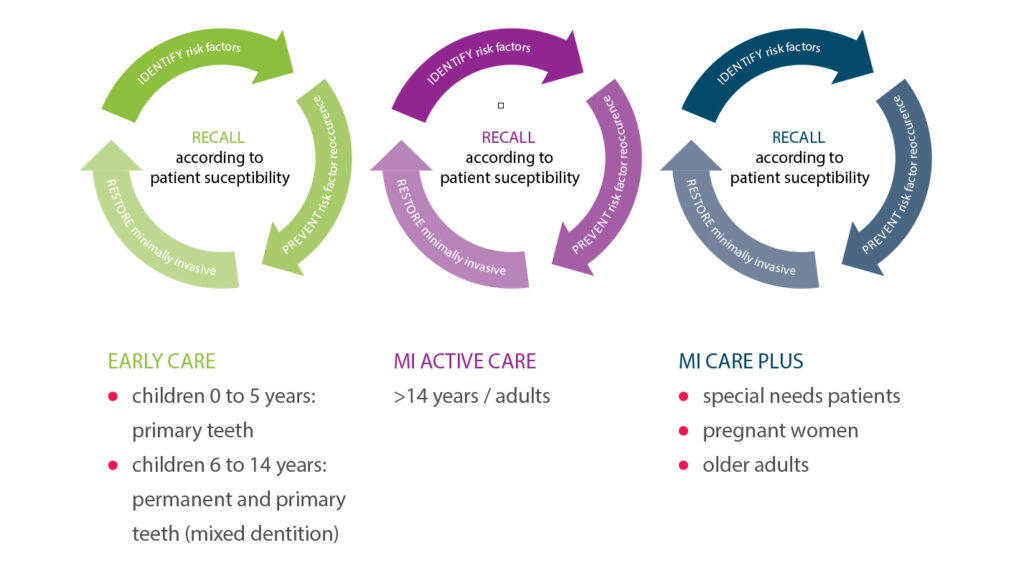A new approach to dental care: Minimum Intervention is smart dental practice.
The traditional approach tends to treat only the symptoms and not the root cause of the issue. As a result, patients with weaker teeth remain unprotected, and will likely have to fix and replace their teeth indefinitely. As opposed to that, Minimum Intervention enables patients to regain control over the state of their teeth. It is now possible to have permanently healthy teeth with minimal effort.
Dental medicine that treats only symptoms isn’t a long-term solution – Minimum Intervention is!
This technique was developed by a globally renowned team of dentists, scientists, researchers, and educators. Also, GC-Japan has been developing and perfecting the equipment for more than a decade. Thanks to those efforts, Minimum Intervention has become a standard in most developed countries.
Minimum Intervention (MI) enables us to understand tooth decay and periodontopathic issues, so that we could combat them smartly. Thanks to MI, we’ve obtained an intelligent, trustworthy treatment plan in dental medicine. In our dental office, the MI technique has been applied since 2007, and we constantly improve the method.
The MI® approach works on four levels:
![]()
1. Recognizing and assessing all potential risk factors for early-stage decay (such as diet, hygiene, genetics…) in every single patient.
![]() 2. Fixing the teeth with contemporary bioactive (so called SMART) materials that protect themselves from new cavities, which significantly improves overall dental health. We aim to prevent tooth decay by minimizing and removing risk factors.
2. Fixing the teeth with contemporary bioactive (so called SMART) materials that protect themselves from new cavities, which significantly improves overall dental health. We aim to prevent tooth decay by minimizing and removing risk factors.
![]()
3. Remineralizing enamel and protecting further damage.
![]()
4. Following up and scheduling regular check-ups as needed, depending on the individual risk level.
The MI approach is adapted to individual particularities
The MI concept is adapted to age groups and other individual qualities: the needs of children, adults, seniors, pregnant women and high-risk patients. In that sense, we are equipped with the following:
-
- diagnostic tests for bacteria and saliva that identify patients at risk of tooth decay
- products that help maintain mineral balance and prevent disease
- restorative biomimetic materials that renew and protect the teeth

In order to improve the quality of your teeth, we advise the following within the MI® approach:
- Fix all decayed teeth and replace all defective fillings with so-called SMART fillings. The main drawback of traditional materials is a high chance of new decay in the future. The MI materials follow the shape of the tooth a lot more precisely and closely, which helps maintain hygiene. Thanks to the fluoride content and chemical connectivity to the dental structure, we prevent new cavities at the edges of the filling. The fluoride contained within the filling is also present in its surroundings, and as such protects it from decaying. Also, the fluoride contained in toothpaste and other products permeates the filling and replenishes its reserves!
- Regularly use mouthwash with low fluoride content (easily found in pharmacies).
- Use chewing gum that contains xylitol (check the information on your pack of gum).
- Undergo local fluoride treatment at the office every six months.
- Use the MI Tooth Mousse remineralization crème (ordered at the dental office).
Find out more about the MINIMUM INTERVENTION:
Minimal intervention dentistry
MI DENTISTRY HANDBOOK (pdf)



